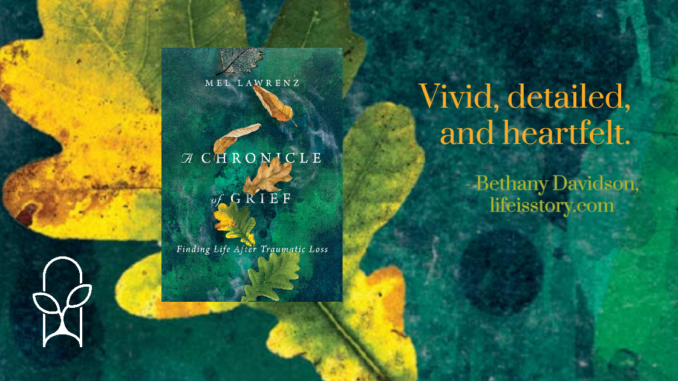
Published by IVP on July 21, 2020
Genres: Non-Fiction, Christian Life, Parenting
Buy on Amazon
Goodreads

"Eva not breathing. Pray." That text message was Mel Lawrenz's entry into the harsh reality of losing his thirty-year-old daughter. Things would never be the same. How could he and his family cope with this devastating loss? In this narrative of grief, Pastor Mel Lawrenz chronicles how his family struggled to survive the sudden death of their beloved daughter. In raw, vivid episodes, he describes the immediacy of the pain and the uncertainty of what comes next. In the agony of traumatic loss, Lawrenz apprehends the realities of love and life and offers insights on how to navigate our life priorities before or after tragedy hits. You are not alone. You too can find a way forward.
After pastor and author Mel Lawrenz lost his beloved adult daughter to a traumatic medical event, he began to post some of his reflections about grief on Facebook. The reception there led him to contemplate writing a book about it, and I am glad that he did, because A Chronicle of Grief: Finding Life After Traumatic Loss is an intimate, heartfelt, and raw guide that will encourage people going through similar experiences. Lawrenz had previously co-authored a book about grief, and this book’s appendices reprint two of its chapters, but even though I found them insightful, they could not compare to the vivid, detailed, and heartfelt reflections that he wrote in the midst of loss.
This short, simple book made me cry multiple times, and by the end of it, I felt like I knew his daughter at some level. Eva’s personality and passions become evident through his words, and it is obvious from the very beginning how deeply and profoundly he loves her. He writes about how her death has affected his wife and son as well, and mentions how important it has been for them to understand their different methods of experiencing and expressing grief, so that they can support each other and not take it personally when their approaches clash. Lawrenz also writes about other practical aspects of grief, such as packing up his daughter’s books and papers, and he shows how her death has affected him in everyday life, not just in his most obvious, public moments of mourning.
This book is best for someone who shares Lawrenz’s faith, since he weaves a number of different Bible verses and Christian reflections into the book, but because he does not offer platitudes or overspiritualize his pain, his voice can also be credible and reassuring for non-Christians who are walking through similar forms of grief. More than anything, Lawrenz writes in a deeply raw and personal way, reflecting on the flow of seasons, the changes that different years have brought, and the ways that he holds onto his relationship with Eva, even though she is gone. The book is repetitive at times, but so is grief, and people who are dealing with grief’s cyclical nature may find this deeply helpful.
Even though Lawrenz writes specifically about his experience losing an adult child, many of his reflections will ring true to people who have lost loved ones from other types of relationships. Lawrenz addresses common experiences of traumatic loss that supersede someone’s specifics, and this book can be a great comfort to people who are suffering from the death of anyone whom they have deeply loved. I would also recommend this book to pastors, counselors, and caring friends who want to know how to better support someone who is suffering from loss. Although this book speaks to one man’s specific experiences, its themes are universal, and this glimpse into everyday life after bereavement can help people better understand and support the grieving people in their lives.



